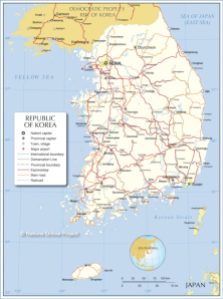For general information about the country profiles click here.
 Population: 50,004,441
Population: 50,004,441
HDI ranking: 12/187
HDI score: 0.909
Though it has been considered as the key to democratic transition, decentralization process was limited or delayed by the dominant government power in Korea. Yet, despite the strong centralism, more and more residents and civil organizations at the local level strike for democracy reform nowadays (Bae, 2005).
Local governance at a glance
- South Korea is divided into the Special Metropolitan City of Seoul governed by a mayor that is equivalent to central government ministers, 6 other metropolitan cities and 9 provinces both governed by political representatives. The heads of local governments are appointed by the central government (UCLG, 2008).
- The local governments are semi-autonomous and consist of executive and legislative bodies of their own and are administrated by Ministry of Government Administration and Home Affairs (UCLG, 2008).
- The local authorities in the district are to be elected by universal, equal and direct vote (UCLG, 2008).
- There are three tiers of the local governments, which are regional level (3), municipal level (6), and basic level (6) (UCLG, 2008).
- South Korea adopted an Electoral Law that any political party shall recommend not less than 50% women candidates for seats in local councils and not less than 30% of women candidates for local council members of local constituencies and not less than one woman candidate for district representatives (Quota Project, 2014).
Civil society actors include
- People’s Solidarity for Participatory Democracy (PSPD) is an organization that works on Korea’s decentralization reforms through various campaign strategies.
- Citizens’ Coalition for Economic Justice (CCEJ) exists to promote democratic and social development.
- The essential objective of Minbyun seeks to foster democratic governance and increase public awareness.
Capacity building institutions
- Presidential Committee on Government Innovation and Decentralization (PCGID) promotes decentralization in South Korea by organizing meetings and conferences (Bae, 2012).
- Four local government associations (LGAs) have power to pressure on the central government for decentralization, which are the National Association of Governors, the National Association of Mayors, the Association of Metropolitan and Provincial Council Chairs (Bae, 2012).
Fiscal control
- The local revenues are consisted of local taxes, non-tax revenues, local shared taxes, subsidies, and borrowings including bonds and loans (UCLG, 2008).
- Local government has the power to collect local taxes and fees (UCLG, 2008).
- Local government receives some fiscal assistance in the form of transfers from the central government (UCLG, 2008).
Key initiatives for participatory local governance
- The size of local government expenditures has increased faster than central government and has doubled as the size of public sector has steadily grown since 1985 (UCLG, 2008).
- In January 1991, the central administrations established a legislation that strengthened the powers of local government bodies (Bae, 2005).
- From 2005, the Local Referendum Act allowed the power of councils to hold referendums and from 2007 the Local Recall System of Elected Mayors and Councilors are effective. These reforms bring about a renewal of local democracy and greater participation (UCLG, 2008).
- After “local political arena” has created, local citizens can request their governments to disclosure public information since 1996, address a petition for revising or abolishing local ordinances since 2000, participate in local budgeting process since 2004, and even oust incompetent local executives since 2006 (Bae, 2005).
Challenges for participatory local governance
- The functions of local governments are not clearly defined and many decisions-making process are happened at the central level (UCLG, 2008).
- The lack of monitoring power could not ensure the implementation of transfer of power to local authorities (Bae, 2005).
Recent posts on this website about this country:
- Citizen participation and transparency in local government : an empirical analysis : paper (2012)
- Building trust in government : innovations in governance reform in Asia (2010)
- Paths and pitfalls of decentralisation for sustainable forest management : experiences of the Asia-Pacific region (2004)
- Fostering community-driven development : what role for the state? (2003)
List of sources (in order of citation):
Bae, Yooil 2005: “Decentralization and Transformation of Central State in South Korea: The Role of Local and Civil Society”
UCLG, 2008: “UCLG Country Profiles: Republic of Korea”
QuotaProject, 2014: “Republic of Korea”
Yooil Bae, 2012: “Civil Society and Local Activism in South Korea’s Local Democratization”
